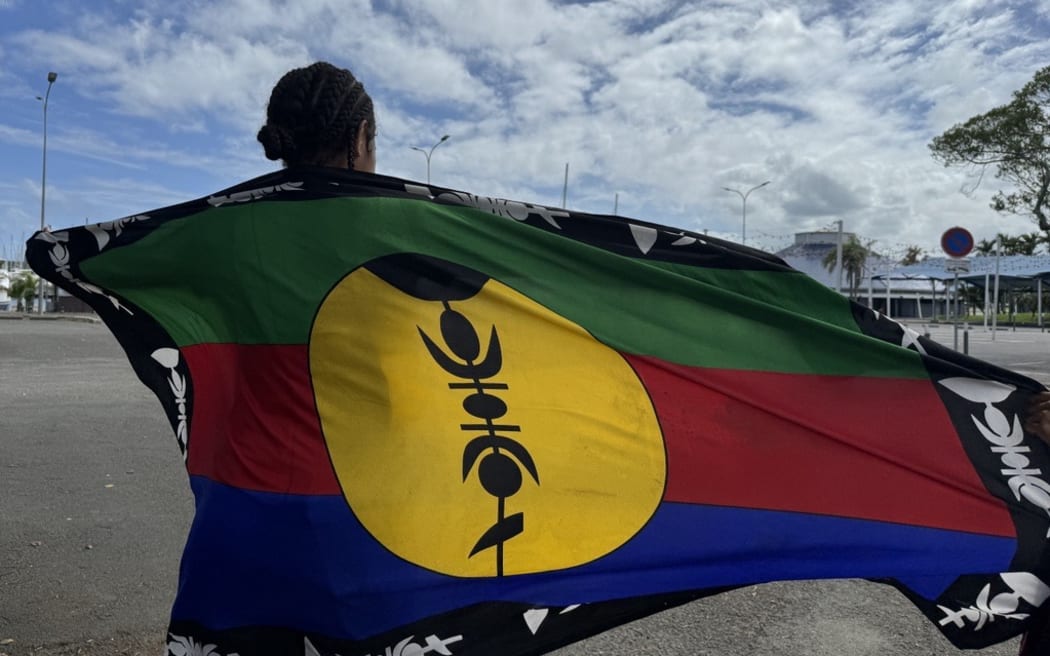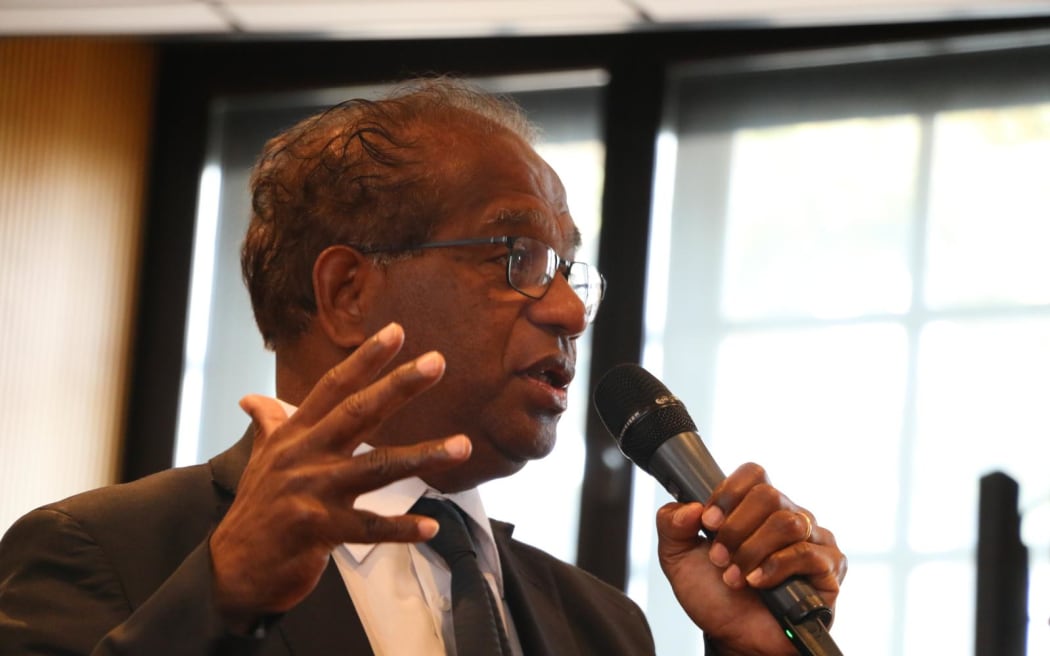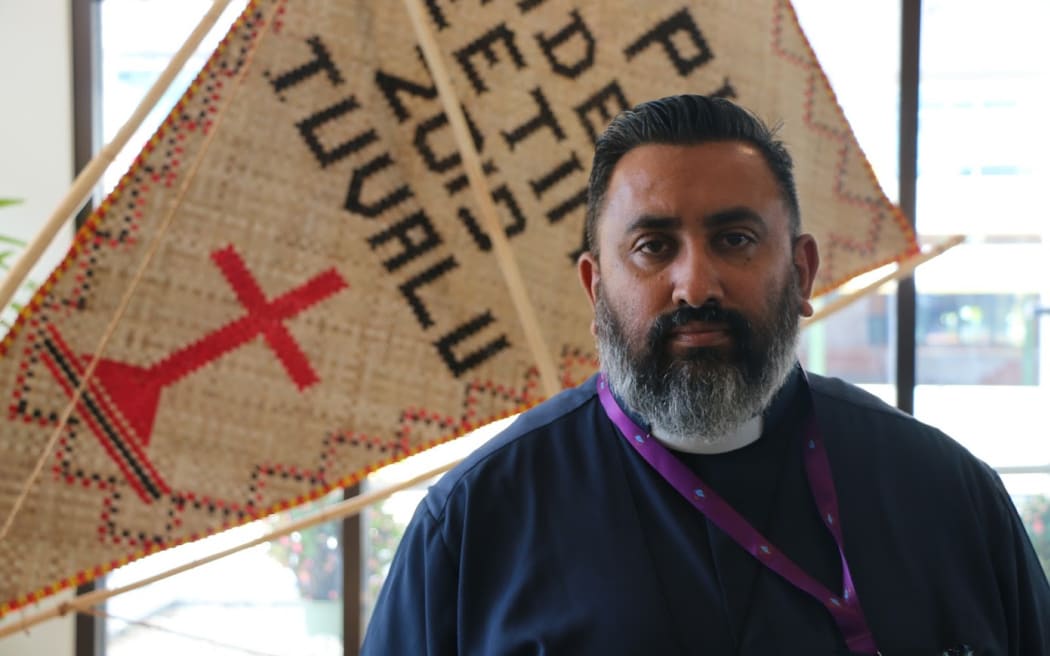By Lydia Lewis, RNZ Pacific journalist
As New Caledonia passes the one-month mark since violent and deadly clashes erupted on last month, there has been no clear path put forward by Paris as far as the Kanak and Socialist National Liberation Front (FLNKS) is concerned.
Yesterday, eight people — including the leader of the Field Action Coordinating Cell (CCAT) Christian Téin — were arrested by New Caledonia’s security forces over the unrest since May 13.
According to the Public Prosecutor’s office, they face several potential charges, including organised destruction of goods and property and incitement of crimes and murders or murder attempts on officers entrusted with public authority.
- LISTEN TO RNZ PACIFIC WAVES: Listen to the people that were harassed in their houses” – French Ambassador to the Pacific Véronique Roger-Lacan
- New Caledonia police arrest pro-independence leader among 11 people over deadly protests – Al Jazeera
- French police raid pro-independence Kanak party HQ, arrest eight in crackdown
- Nouméa’s Tontouta International Airport reopened after civil unrest
- Other New Caledonia unrest reports
“All the unrest, all the troubles, is the result of the ignorance of the French government,” said New Caledonia territorial government spokesperson Charles Wea.
“We cannot have peace without the independence of the country. New Caledonia will always get into trouble if the case of independence is not taken into consideration,” he said.
But speaking in an exclusive interview with RNZ Pacific, the French Ambassador to the Pacific, Véronique Roger-Lacan, said there were options to resolve the ongoing conflict — but the violence needed to stop first.
Roger-Lacan said there was a national process to address the independence issue — that was through the controversial constitutional changes which has sparked the unrest.

Paris is also engaged with the UN Committee on Decolonisation (C24) where options of self-determination through independence or free association with an independent state are being discussed.
On top of that, Paris has met with the Pacific Islands Forum (PIF) heads, or troika, over the phone and said talks are underway to either organise a meeting with regional leaders soon, or at the PIF leaders meeting in Tonga in August.
Whatever the option, the FLNKS and the wider pro-independence movement want a robust process that leads to independence, said Wea.

Militarisation ‘fake news’
More than 3000 security forces have been deployed, and armoured vehicles with machine gun capability have also been sent to French territory.
Roger-Lacan said the forces were needed and she rejected claims that the territory was being “militarised”.
She stressed that the thousands of special forces deployed were “necessary” to contain the violence and restore law and order.
Territorial Route 1 has been blocked by barricades erected by the rioters, and Roger-Lacan posed the question: “How do you remove this type of barricade if you have no forces?”
‘A militarisation movement’ – Reverend Bhagwan
Pacific civil society groups continue to deplore France’s actions leading up to the ongoing unrest and its response to the violence.
They have called for the immediate withdrawal of the extra forces and a phasing down of security options.
Pacific Conference of Churches general secretary Reverend James Bhagwan told RNZ Pacific France’s heavy deployment of security forces looked like militarisation to him.
“We have seen far too much already these last few weeks to be fooled,” Bhagwan said.
“We still have militias who are armed, we still have increasing numbers of security forces on the ground. That is militarisation whether it is formal or something that’s been organised in a different way.
“We are just calling it as we see it.
“We’ve also seen the way in which the French government treats that particular area, recognising that this is part of maintaining their colonies as part of the Indo-Pacific strategy, that there is a militarisation movement happening by the French in the Pacific.”
‘Get their facts right’
However, Ambassador Roger-Lacan vehemently disagrees with such claims, saying individuals such as Reverend Bhagwan need to “get their facts right”.
She said claims that the French state had militarised New Caledonia and the region, must be corrected because “it’s not true”.
“First of all, violence had to be stopped, and public order and law enforcement had to be resumed,” she said.
“I would like to suggest for those people [civil society] to watch the houses that were burnt, to listen to the people that were harassed in their houses, to listen to people who were scared of the violence.”
She said such comments were biased, doubling down that “reinforcement was needed”.

The general secretary of the Pacific Council of Churches, James Bhagwan. Photo: RNZ / Jamie Tahana
Intergenerational trauma
The French Ambassador to the Pacific said concerns that the death toll from the unrest was much higher than reported was also not true.
The death toll stands at eight, she said, adding that three state security officers and five civilians had died.
But some indigenous Kanaks have called for Paris to investigate the death toll, as they believe more young rioters were feared dead.
Roger-Lacan wants worried parents to know France had heard them and concerned parents could call the 24/7 hotline.
“With gendarmes in New Caledonia everywhere, they know all the families, they know all the tribes,” she said.
“It is not true that we don’t have the appropriate links with the whole population.”
Reverend Bhagwan believes it is naive to expect communities to simply trust France given the political history of the territory.
He said there was “intergenerational trauma” simmering under the surface, especially when Kanaks see French forces on their land.
“You can understand then why mothers are concerned about their children, and so to ignore that intergenerational trauma for people in Kanaky, is really a little bit of naivety on the French High Commissioner’s part,” Reverend Bhagwan said.
But one thing all parties agree on is that “force” is not the answer to solve the current crisis.
“Of course, force is not the answer,” Ambassador Roger-Lacan said, but added “force has to be used to bring back public order sometimes”.
This post was originally published on Asia Pacific Report.